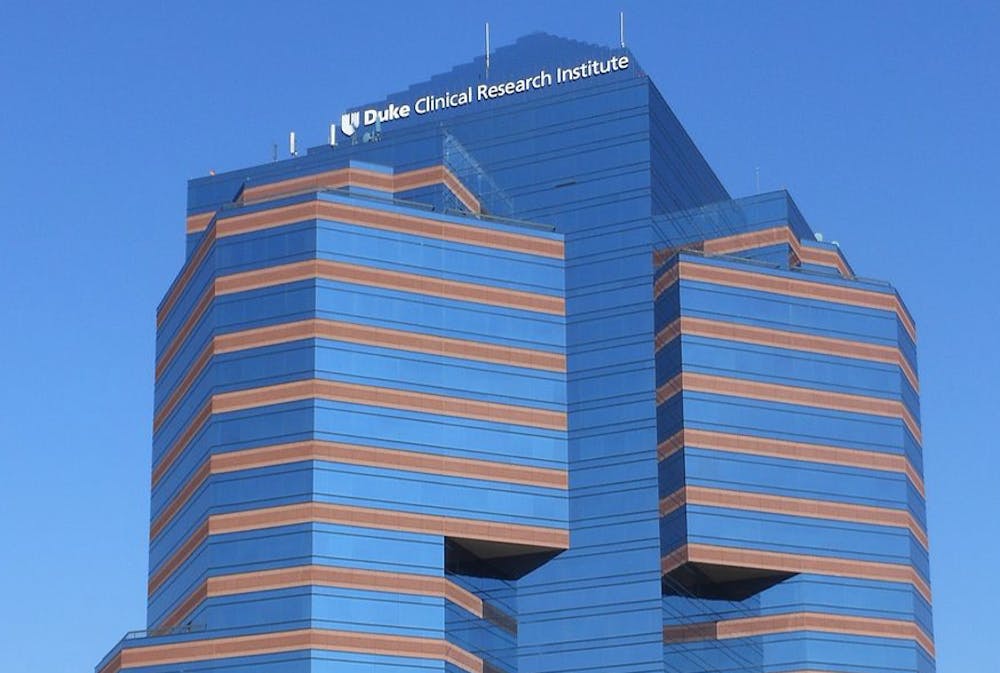Construction is expected to begin shortly on two new mixed-use buildings in downtown Durham, one of which will be occupied by the Duke Clinical Research Institute.
The two seven-story buildings will make up a 350,000-square foot complex, to be built along with an eight-story screened parking deck, in what is currently a large parking lot on Morris Street. The construction represents the first new buildings of the Durham Innovation District, a project launched in 2014 which aims to make a 15-acre site in downtown Durham a hub of research and scientific innovation. The DCRI headquarters are located downtown in a 15-story building on Pratt Street, and with this lease deal, the institute will gain additional office space.
Scott Selig, Duke's associate vice president of capital assets and real estate, explained that as the DCRI—considered the largest academic clinical research organization in the world—has continued to grow, it has developed a need for more space.
“DCRI is already down in the area in the adjacent building," Selig said. "They needed some additional space. Since their move to downtown Durham, they found that people like [the location]. This will be a way to consolidate their needs into one camp.”
The two new buildings, referred to as the North and South buildings, are being developed and designed by teams from Longfellow Real Estate Partners—the Boston-based firm in charge of the Durham Innovation District—in collaboration with Durham-based Duda Paine Architects and Measurement Inc. Construction is expected to be completed by the spring of 2018, according to a press release.
The DCRI will be occupying the South Building, and Longfellow is still working on marketing the North Building to technology and innovation based enterprises.
Adam Sichol, managing partner at Longfellow, wrote in an email that given Durham’s downtown vacancy rate of less than 2 percent, the developers decided to take a chance on constructing the North building. He added that there has already been strong interest from mid-to-large sized technology companies and startups that are growing out of their current space.
“We are always assessing good opportunities in the Triangle, focusing on only the very best locations," wrote Jessica Brock, managing director at Longfellow Real Estate Partners, in an email.
The plans for the two new buildings represent the latest development of the Durham Innovation District, which has been carefully planned to create a dynamic research hub in the heart of Durham and to attract business and commerce to the growing city. Thus far, the project's progress has largely been limited to the restoration of old buildings downtown. The Carmichael Building was transformed into laboratory space in 2014 and Duke’s Innovation and Entrepreneurship Initiative moved into the Imperial Building in 2015.
Brock noted that there are plans for more than 900,000 additional square footage for labs, offices, residential and retail spaces in the Durham Innovation District. The Durham Innovation District’s master plan calls for a total of 1.7 million square feet of lab, tech, office, retail and residential space.
“The Durham Innovation District is fast progressing to be one of only a few urban clusters that combines (1) top academic research, (2) an abundance of startups, (3) talented workforce that can live, work and play in the same neighborhood," Sichol wrote.
Sichol also noted that, in many ways, the construction of the Durham Innovation District was designed to mirror the development of Kendall Square in Cambridge, Massachusetts, which attracts science, technology and business firms to work alongside academics at the Massachusetts Institute of Technology.
As the Durham Innovation District continues to grow, Duke has become an increasingly bigger piece of the master plan.
“Going back six years, the vision was to collaborate with Duke and its talented researchers to provide first class space downtown that would create a magnet for science and technology firms to work alongside and collaborate with Duke researchers, Ph.Ds and graduates," he wrote.
Today, the Durham Innovation District is home to multiple tenants affiliated with the University, including the DCRI, the Molecular and Physiology Institute, the Sarah W. Stedman Nutrition and Metabolism Center and the Innovation and Entrepreneurship Initiative. Private companies such as Nutanix, Method Saavy, Measurement Inc. and NC Biolabs also call the Durham Innovation District home.
Get The Chronicle straight to your inbox
Signup for our weekly newsletter. Cancel at any time.

